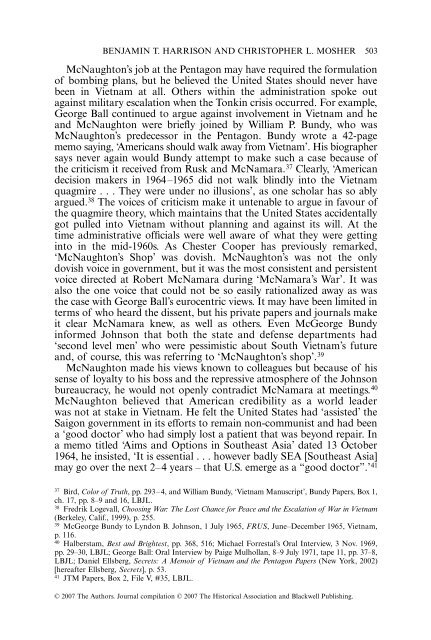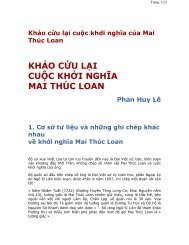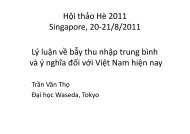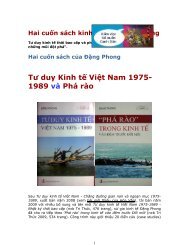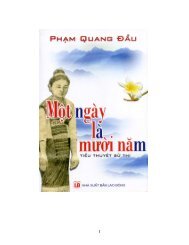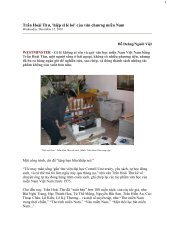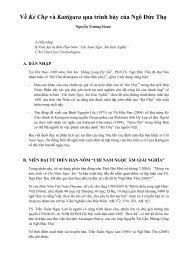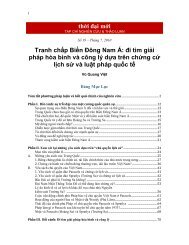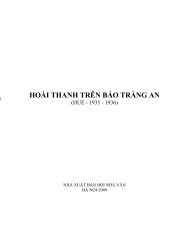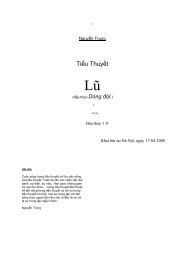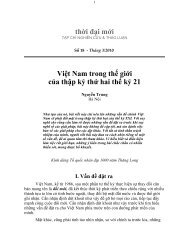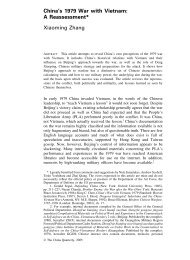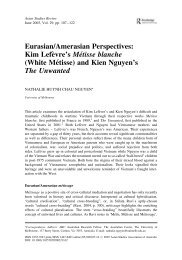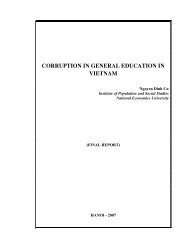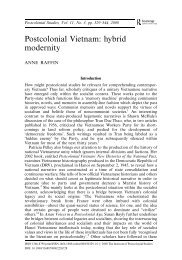John T. McNaughton and Vietnam: The Early Years as ... - Viet-studies
John T. McNaughton and Vietnam: The Early Years as ... - Viet-studies
John T. McNaughton and Vietnam: The Early Years as ... - Viet-studies
Create successful ePaper yourself
Turn your PDF publications into a flip-book with our unique Google optimized e-Paper software.
BENJAMIN T. HARRISON AND CHRISTOPHER L. MOSHER 503<br />
<strong>McNaughton</strong>’s job at the Pentagon may have required the formulation<br />
of bombing plans, but he believed the United States should never have<br />
been in <strong><strong>Viet</strong>nam</strong> at all. Others within the administration spoke out<br />
against military escalation when the Tonkin crisis occurred. For example,<br />
George Ball continued to argue against involvement in <strong><strong>Viet</strong>nam</strong> <strong>and</strong> he<br />
<strong>and</strong> <strong>McNaughton</strong> were briefly joined by William P. Bundy, who w<strong>as</strong><br />
<strong>McNaughton</strong>’s predecessor in the Pentagon. Bundy wrote a 42-page<br />
memo saying, ‘Americans should walk away from <strong><strong>Viet</strong>nam</strong>’. His biographer<br />
says never again would Bundy attempt to make such a c<strong>as</strong>e because of<br />
the criticism it received from Rusk <strong>and</strong> McNamara. 37 Clearly, ‘American<br />
decision makers in 1964–1965 did not walk blindly into the <strong><strong>Viet</strong>nam</strong><br />
quagmire . . . <strong>The</strong>y were under no illusions’, <strong>as</strong> one scholar h<strong>as</strong> so ably<br />
argued. 38 <strong>The</strong> voices of criticism make it untenable to argue in favour of<br />
the quagmire theory, which maintains that the United States accidentally<br />
got pulled into <strong><strong>Viet</strong>nam</strong> without planning <strong>and</strong> against its will. At the<br />
time administrative officials were well aware of what they were getting<br />
into in the mid-1960s. As Chester Cooper h<strong>as</strong> previously remarked,<br />
‘<strong>McNaughton</strong>’s Shop’ w<strong>as</strong> dovish. <strong>McNaughton</strong>’s w<strong>as</strong> not the only<br />
dovish voice in government, but it w<strong>as</strong> the most consistent <strong>and</strong> persistent<br />
voice directed at Robert McNamara during ‘McNamara’s War’. It w<strong>as</strong><br />
also the one voice that could not be so e<strong>as</strong>ily rationalized away <strong>as</strong> w<strong>as</strong><br />
the c<strong>as</strong>e with George Ball’s eurocentric views. It may have been limited in<br />
terms of who heard the dissent, but his private papers <strong>and</strong> journals make<br />
it clear McNamara knew, <strong>as</strong> well <strong>as</strong> others. Even McGeorge Bundy<br />
informed <strong>John</strong>son that both the state <strong>and</strong> defense departments had<br />
‘second level men’ who were pessimistic about South <strong><strong>Viet</strong>nam</strong>’s future<br />
<strong>and</strong>, of course, this w<strong>as</strong> referring to ‘<strong>McNaughton</strong>’s shop’. 39<br />
<strong>McNaughton</strong> made his views known to colleagues but because of his<br />
sense of loyalty to his boss <strong>and</strong> the repressive atmosphere of the <strong>John</strong>son<br />
bureaucracy, he would not openly contradict McNamara at meetings. 40<br />
<strong>McNaughton</strong> believed that American credibility <strong>as</strong> a world leader<br />
w<strong>as</strong> not at stake in <strong><strong>Viet</strong>nam</strong>. He felt the United States had ‘<strong>as</strong>sisted’ the<br />
Saigon government in its efforts to remain non-communist <strong>and</strong> had been<br />
a ‘good doctor’ who had simply lost a patient that w<strong>as</strong> beyond repair. In<br />
a memo titled ‘Aims <strong>and</strong> Options in Southe<strong>as</strong>t Asia’ dated 13 October<br />
1964, he insisted, ‘It is essential . . . however badly SEA [Southe<strong>as</strong>t Asia]<br />
may go over the next 2–4 years – that U.S. emerge <strong>as</strong> a “good doctor”.’ 41<br />
37 Bird, Color of Truth, pp. 293–4, <strong>and</strong> William Bundy, ‘<strong><strong>Viet</strong>nam</strong> Manuscript’, Bundy Papers, Box 1,<br />
ch. 17, pp. 8–9 <strong>and</strong> 16, LBJL.<br />
38 Fredrik Logevall, Choosing War: <strong>The</strong> Lost Chance for Peace <strong>and</strong> the Escalation of War in <strong><strong>Viet</strong>nam</strong><br />
(Berkeley, Calif., 1999), p. 255.<br />
39 McGeorge Bundy to Lyndon B. <strong>John</strong>son, 1 July 1965, FRUS, June–December 1965, <strong><strong>Viet</strong>nam</strong>,<br />
p. 116.<br />
40 Halberstam, Best <strong>and</strong> Brightest, pp. 368, 516; Michael Forrestal’s Oral Interview, 3 Nov. 1969,<br />
pp. 29–30, LBJL; George Ball: Oral Interview by Paige Mulhollan, 8–9 July 1971, tape 11, pp. 37–8,<br />
LBJL; Daniel Ellsberg, Secrets: A Memoir of <strong><strong>Viet</strong>nam</strong> <strong>and</strong> the Pentagon Papers (New York, 2002)<br />
[hereafter Ellsberg, Secrets], p. 53.<br />
41 JTM Papers, Box 2, File V, #35, LBJL.<br />
© 2007 <strong>The</strong> Authors. Journal compilation © 2007 <strong>The</strong> Historical Association <strong>and</strong> Blackwell Publishing.


